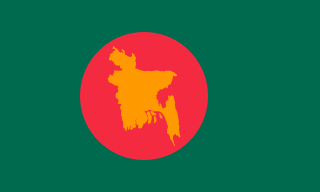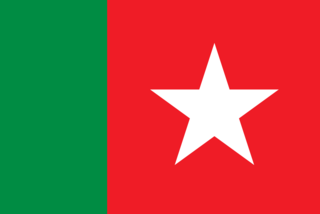See also
- Awami League, Bangladesh
- Awami National Party, Pakistan
The National Awami Party (English: National People's Party) was a political party in Pakistan that existed from 1957 to 1967.
National Awami Party may also refer to:

Politics of Bangladesh takes place in a framework of a parliamentary representative democratic republic, whereby the Prime Minister of Bangladesh is the head of government, and of a multi-party system. Executive power is exercised by the government. Legislative power is vested in both the government and parliament. The Constitution of Bangladesh was written in 1972 and has undergone seventeen amendments.

Sheikh Mujibur Rahman was the founder of Bangladesh. Bangabandhu first served as the titular president of the Provisional Government of Bangladesh between April 1971 and January 1972. He then served as Prime Minister of Bangladesh from the Awami League between January 1972 and January 1975. Mujib finally served as President again during BAKSAL from January 1975 till his assassination in August 1975. In 2011, the 15th constitutional amendment in Bangladesh referred to Sheikh Mujib as the Father of the Nation who declared independence; these references were enshrined in the fifth, sixth, and seventh schedules of the constitution.

The Bangladesh Awami League, often simply called the Awami League or AL, is a centrist to centre-left political party in Bangladesh and one of the major political parties in Bangladesh, being the ruling party of Bangladesh since 2009.

The National Awami Party (NAP), translated from Urdu to English as National People's Party, was the major left-wing political party in East and West Pakistan. It was founded in 1957 in Dhaka, erstwhile East Pakistan, by Abdul Hamid Khan Bhashani and Yar Mohammad Khan, through the merger of various leftist and progressive political groups in Pakistan. Commonly known as the NAP, it was a major opposition party to Pakistani military regimes for much of the late 1950s and mid-1960s. In 1967 the party split into two factions.
Independence of Bangladesh was declared on 26 March 1971, celebrated as Independence Day, from Pakistan. The Independence Day of Bangladesh is celebrated on 26 March when Sheikh Mujibur Rahman declared the independence of Bangladesh. The Bangladesh Liberation War started on 26 March and lasted till 16 December 1971 which is celebrated as Victory Day in Bangladesh. There is a dispute along partisan line on who declared the Independence of Bangladesh. The Awami League claim Sheikh Mujibur Rahman while the Bangladesh Nationalist Party claim it was Ziaur Rahman.

Tajuddin Ahmad was a Bangladeshi politician and statesman. He led the Provisional Government of Bangladesh as its prime minister during the Bangladesh Liberation War in 1971 and is regarded as one of the most instrumental figures in the birth of Bangladesh.

Bangladesh elects on national level a legislature with one house or chamber. The unicameral Jatiyo Sangshad, meaning national parliament, has 350 members of which 300 members are directly elected through a national election for a five-year term in single-seat constituencies while 50 memberships are reserved for the women who are selected by the ruling party or coalition. The Prime Minister is the head of the government. The president who is the head of the state is elected by the National Parliament. The president of Bangladesh is a ceremonial post and does not exercise any control over the running of the state.

General elections were held in Pakistan on 7 December 1970 to elect members of the National Assembly. They were the first general elections since the independence of Pakistan and ultimately the only ones held prior to the independence of Bangladesh. Voting took place in 300 general constituencies, of which 162 were in East Pakistan and 138 in West Pakistan. A further thirteen seats were reserved for women, who were to be elected by members of the National Assembly.

The Independence Day of Bangladesh is celebrated on 26 March as a national holiday in Bangladesh. It commemorates the country's declaration of independence from Pakistan in the early hours of 25 March 1971.
Inam-ul-Haq, meaning Gift of the Truth, is a masculine Islamic given name.).

The independence of Bangladesh was declared on 26 March 1971 at the onset of the Bangladesh Liberation War by Bangabandhu Sheikh Mujibur Rahman; the following day the declaration was broadcast by Major Ziaur Rahman in a radio broadcast. On 10 April, the Provisional Government of Bangladesh issued a proclamation on the basis of the previous declaration and established an interim constitution for the independence movement.
Muslim League may refer to:

Abdul Hamid Khan Bhashani, often shortened as Maulana Bhashani, was a Bengali politician. His political tenure spanned the British colonial India, Pakistan and Bangladesh periods. Maulana Bhashani was popularly known by the honorary title Mozlum Jananeta for his lifelong stance advocating for the poor. He gained nationwide mass popularity among the peasants and helped to build the East Pakistan Peasant Association. Owing to his political leaning to the left, often dubbed Islamic Socialism, he was also called 'The Red Maulana'.He is considered as one of the main pillers of Bangladeshi independence of 1971.
In Urdu language, Awami is the adjectival form for Awam, the Urdu language word for common people.
Mosharraf Hossain may refer to:

Awami League was a Pakistani political party founded by Huseyn Shaheed Suhrawardy in February 1950. Pir of Manki Sharif and Khan Ghulam Mohammad Khan from the North-West Frontier Province (NWFP) joined it soon afterwards.
BNP may refer to:
The non-cooperation movement of 1971 was a historical movement in then East Pakistan by the Awami League and the general public against the military government of Pakistan in March of that year. After the announcement of the suspension of the session of the National Assembly of Pakistan on March 1, the spontaneous movement of the people started, but officially on the call of Sheikh Mujibur Rahman, the non-cooperation movement started on March 2 and continued until March 25. The movement lasted for a total of 25 days. The main objective of this movement was to ensure the autonomy of East Pakistan from the central government of Pakistan. During this period, the control of the central government of West Pakistan over the civilian administration of East Pakistan was almost non-existent. At one stage of the movement, the whole of East Pakistan, except the cantonments, was practically under the command of Sheikh Mujibur Rahman.
Amjad Hossain (1942–2018) was a Bangladeshi filmmaker.

The Bangladesh National Awami Party, or National Awami Party (Muzaffar), is a left wing political party in Bangladesh.